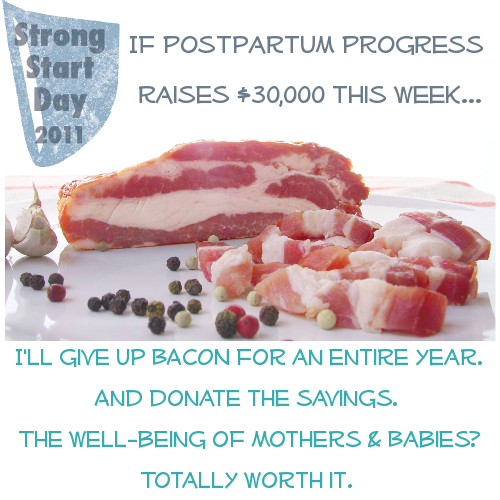A few of you who read my blog regularly and follow me on Twitter may remember a conversation I held with a woman who asked at her blog if Postpartum Depression is a cop-out defense when it comes to infanticide. This post is my response. It’s taken me some time to write due to research and the intense emotional aspect of this issue. The post below is lengthy. It is triggering. There are graphic descriptions beginning in the first paragraph. If you are easily triggered, go watch this video instead. Oh, and if you go watch the video? I’m not responsible for the ensuing addiction. (I’ve been listening to it almost non-stop for the past 36 hours.)
Humankind cannot bear too much reality.
T.S. Eliot
Since the dawn of time, humanity has grappled with parental induced deaths of infants and children. In Paleolithic and Neolithic ages, infanticide was an acceptable practice, one meant to preserve the balance of man and his immediately available resources. Later, in some cultures, infanticide grew to be gender-based with girls specifically sacrificed due to the cost of dowry required at marriage. Ritual sacrifice, unwanted birth, illegitimate birth, gender disappointment (including financial reasons such as dowry), birth defects or deformities, preservation of ecological balance, and a number of additional reasons peppered several cultures as legitimate reasons for the practice of infanticide.
Common early methods of infanticide included but were not limited to: exposure, suffocation or asphyxia, ritual sacrifice, brute force, blunt force trauma, and others. The most common method was exposure as this freed the parents from any direct involvement in their infant’s actual death according to societal belief. In fact, Romans often abandoned their infants with the hopes they would be raised by others, in which case they were referred to as “foundlings.”
Infanticide, the murder of a child older than 24 hours yet younger than 12 months, is carried out in our modern ages primarily by the mother and typically does not involve brute force or violent methods. The child is instead smothered, drowned, poisoned, or asphyxiated. Some cases do involve more force and more heinous methods.
Most mothers who commit infanticide are in a lower financial class and lack support from family and community. It’s also important to note many victims of infanticide are not first born but instead second or later born children.
Interestingly enough, not many fathers were cited in the research in regard to infanticide. In fact, only four known cases of infanticide with fathers at fault are present in current literature spanning the subject of infanticide. Fathers are far more prevalent in filicide cases which are cases involving children over 12 months of age. In these cases, the father is more likely to also harm the mother and himself in addition to any children involved.
In many infanticide cases involving mothers, a mental health disorder is cited as part of the defense or reason for the crime. Occasionally this directly relates to a Postpartum Mood Disorder, specifically Postpartum Psychosis. But for the mothers who use a Mental Health defense, is it a worthwhile defense or is it a cop out?
Postpartum Mood Disorders have been mentioned in literature since Hippocrates. Within the past several years, research and community awareness has exposed these conditions as real and palpable. While the true cause is not yet known or fully understood, researchers are working to expose the root cause and improve treatment for those affected. To date, we understand some physical roots but experts are still teasing out the specifics of these causes. Increasing social support surrounding mothers has proven time and again to be key to preventing and shortening the Postpartum Mood Disorder experience. Creating awareness and understanding of a less than Utopian postpartum experience lends a helping hand as well. Improving access to knowledgeable professional resources such as psychiatrists, therapists, and the like, also increases the potential for recovery success in families struggling with Postpartum Mood Disorders.
In many infanticide cases, the mothers and their families did not have adequate access to knowledgeable and compassionate personal, community, or professional help. If they did realize help was needed, they were either discouraged from reaching out for it via societal stigma (ie, the husband didn’t want his wife on medication, they were told to get “over it,” or there were religious beliefs preventing the necessary help) or there simply was not adequate sympathetic and knowledgeable care within physical or financial reach. That said, every infanticide case, as with every Postpartum Mood Disorder case, is different from the next. There are important basic factors from each which carry over into the next but the idiosyncrasies differ which make each case nearly impossible to successfully compare in entirety to the next.
From a legal perspective, choosing a Mental Health Defense is more of a crap shoot or a game of roulette. Postpartum Psychosis and Depression, while a real and experienced phenomenon, is not a guaranteed defense against the crime or action of infanticide. It is a transient defense at best, one wholly dependent upon the current legal status of mental health defense within the state and/or country in which the accused mother resides.
The legal definition of Postpartum Psychosis is not congruent with the medical definition. Both are based, at this time, officially on speculation. The DSM IV eliminated Postpartum Psychosis as a classification. The DSM III listed Postpartum Psychosis in the index but not as a separate illness. According to the DSM III, Postpartum Psychosis was thought to fall under: schizophreniform disorder, brief reactive psychosis, atypical psychosis, major affective disorder, and organic brain syndrome. Postpartum Psychosis occurs in 1 to 2 births out of every 1,000, or at a .1% rate. Postpartum Psychosis is considered a medical emergency with immediate treatment necessary. Onset is sudden and occurs within the first 4 weeks after birth, most often within the first 2-3 days. Postpartum Psychosis is the deadliest of the Postpartum Mood Disorders with a 5% rate of infanticide.
The legal definition of Postpartum Psychosis is no different than that of any other Mental Health Disorder as far as fault-finding and therefore subject to the same rigorous testing of any other Mental Health defense. In the United States, this is dependent on the state of residence. Some states abide by the M’Naughten rule while others abide by the A.L.I. test. In three states, Montana, Idaho, and Utah, the Insanity Defense has been abolished even though these states still admit evidence of mental status in cases.
Even with access to a state by state chart of current Mental Health Defense guidelines, it’s confusing at best to determine what your outcome would be in a court of law. In the United States, there is argument against setting a legal specification for Infanticide as England did in 1922. The current argument against this specification cites lack of a true medical definition for Psychosis along with the potential for a growth of sympathy for mothers who kill and would then invoke the status.
If a mother who commits infanticide invokes a Mental Health Defense, she is not guaranteed freedom if not convicted of murder in the criminal sense but is instead found Not Guilty By Reason of Insanity (a conviction, by the way, not available in ALL states and very dependent upon which test your state uses to determine sanity at time of criminal action). She instead opens herself up to be remanded to a State Mental Institute more than likely with high security. This is not like going home after trial or heading off to a luxurious Club Med vacation. This is dark, gloomy, filled with meds, psychiatrists, therapy, and communing with a population who is equally if not more disturbed than the remanded mother. She is cut off from family, from friends, and from her life, just as if she were sentenced directly to jail. Also, she is continually judged by society, regardless of her convicted status as a psychiatric inmate versus a mainstream high security or possibly death row inmate.
Once remanded to a Mental Institution, the sentenced mother is at the hands of whatever governing body is responsible for releasing psychiatric inmates. This also differs from state to state. More often than not, it is the Court but a few states hand this responsibility to various agencies within their purview. She may also be sentenced to spend a specified amount of years at the Mental Institution despite therapeutic or rehabilitation status, thereby subjecting her to additional exposure to a less than preferable environment for years after conviction just as if she were a mainstream inmate.
The legal and medical diagnosis and defense of Postpartum Psychosis are at best subjective to the diagnostic technologies, sound judgment, and ethics of the medical and legal professionals privy to each individual case of infanticide, thereby further complicating the transient nature of this defense. Therefore a conclusion claiming Postpartum Depression/Psychosis defense as a “cop-out” is erroneous at best as this defense rarely guarantees the defendant the freedom to which she had access prior to her accusation and subsequent proceedings regardless of any legal outcome.
As David G. Myers stated in Social Psychology, “There is an objective reality out there, but we view it through the spectacles of our beliefs, attitudes, and values.” Infanticide has an objective reality in the courtroom. It is a crime. The precise charges depend upon the circumstances of the commission of the actual crime. The defense relies upon the knowledge of the psychological and criminal experts examining the accused. The prosecution relies upon them as well but relies heavier upon the requirements set forth by the law and the justice system to which they are bound. Society at large, meanwhile, is set free to judge, convict, and develop opinions not bound by the court. Our convictions of the accused mothers may be harsher, intrinsically darkened with our own emotions and experiences.
In the end, far more than one life is lost in every case of infanticide. Yes, one life moves on to eternity, but the lives of those surrounding the one lost will never recover. Infanticide is therefore not an incident captured in a vacuum but a ripple vacillating through families and communities like a tornado. Conversations must be held, action must be taken, and the stigma of asking for help signifying failure at motherhood must dissipate if we are to begin to battle the further destruction and loss of mothers, families, and infants to this crime.





